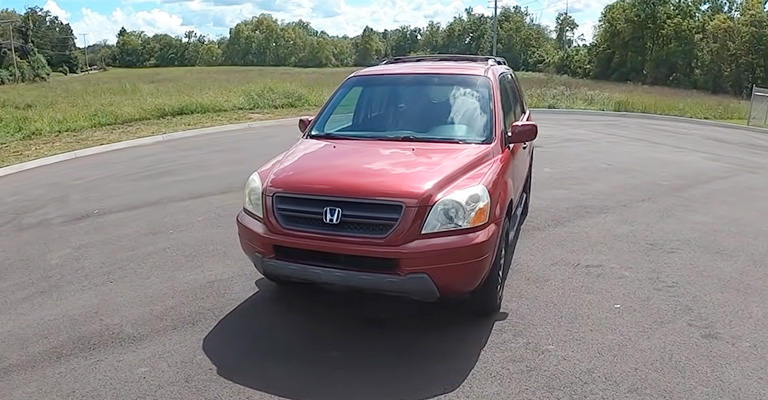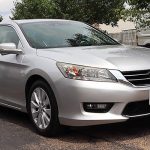The 2003 Honda Pilot is a popular mid-size SUV that was produced by the Japanese automaker Honda. While the Pilot has generally been well-regarded for its reliability and performance, like any vehicle, it is not immune to problems.
Some common problems that have been reported by owners of the 2003 Honda Pilot include transmission issues, problems with the fuel system, and issues with the electrical system.
It’s important to be aware of these potential issues if you own or are considering purchasing a 2003 Honda Pilot. Regular maintenance and timely repairs can help prevent or mitigate many of these problems.

2003 Honda Pilot Problems
1. Warped front brake rotors
The front brake rotors on the 2003 Honda Pilot may become warped over time, resulting in a vibration when braking. This can be caused by a variety of factors, such as excessive heat from heavy braking or improper maintenance.
In order to fix this issue, the front brake rotors will likely need to be replaced.
2. Overheated wire harness
The wire harness in the 2003 Honda Pilot may become overheated, which can cause the low beams to fail. This issue can be caused by a variety of factors, such as a faulty electrical component or a problem with the wiring.
In order to fix this issue, the wire harness may need to be repaired or replaced.
3. Map light not turning on when opening door
Some owners of the 2003 Honda Pilot have reported that the map light (also known as the dome light) does not turn on when the door is opened. This issue can be caused by a faulty electrical component or a problem with the wiring.
In order to fix this issue, the faulty component or wiring will need to be repaired or replaced.
4. Water leak due to poor seal at side marker wire harness
Some owners of the 2003 Honda Pilot have reported a water leak caused by a poor seal at the side marker wire harness.
This issue can occur if the seal around the wire harness becomes damaged or worn out, allowing water to enter the vehicle. In order to fix this issue, the damaged or worn out seal will need to be replaced.
5. Knocking noise from front end, stabilizer link issue
Some 2003 Honda Pilot owners have reported a knocking noise coming from the front end of the vehicle, which may be caused by problems with the stabilizer links.
The stabilizer links are responsible for connecting the suspension to the frame of the vehicle, and if they are damaged or worn out, they can cause a knocking noise.
In order to fix this issue, the damaged or worn out stabilizer links will need to be replaced.
6. Noise and judder on turns due to differential fluid breakdown
Some 2003 Honda Pilot owners have reported a noise and judder when turning, which may be caused by a breakdown of the differential fluid. The differential is responsible for transferring power from the engine to the wheels,
and if the fluid inside it breaks down, it can cause a noise and judder when turning. In order to fix this issue, the differential fluid will need to be replaced.
7. Failed power resistor causing rear blower not to work
Some 2003 Honda Pilot owners have reported that the rear blower (the fan that blows air through the rear vents) does not work due to a failed power resistor. The power resistor is responsible for controlling the speed of the blower motor,
and if it fails, the blower may not work at all. In order to fix this issue, the failed power resistor will need to be replaced.
8. Check engine light for running rough and difficulty starting
Some 2003 Honda Pilot owners have reported that the check engine light comes on and the vehicle is running rough and having difficulty starting. This issue can be caused by a variety of problems, such as a faulty spark plug,
a malfunctioning oxygen sensor, or a problem with the fuel system. In order to fix this issue, the underlying cause will need to be diagnosed and repaired.
9. Porous engine block casting causing engine oil leaks
Some 2003 Honda Pilot owners have reported engine oil leaks, which may be caused by a porous engine block casting. This issue can occur if the engine block has small holes or cracks that allow oil to escape. In order to fix this issue, the engine block will likely need to be replaced.
10. Erratic engine idle speed or engine stalling
Some 2003 Honda Pilot owners have reported that the engine idle speed is erratic or that the engine stalls. This issue can be caused by a variety of problems, such as a faulty idle air control valve, a malfunctioning throttle position sensor, or a problem with the fuel system.
In order to fix this issue, the underlying cause will need to be diagnosed and repaired.
11. Check engine and D4 lights flashing
Some 2003 Honda Pilot owners have reported that the check engine light and the D4 light are flashing. This issue can be caused by a variety of problems, such as a malfunctioning sensor or a problem with the transmission.
In order to fix this issue, the underlying cause will need to be diagnosed and repaired.
12. Check engine light due to sticking rocker pins
Some 2003 Honda Pilot owners have reported that the check engine light comes on due to sticking rocker pins. The rocker pins are small components that connect the valve springs to the rocker arms, and if they become stuck,
it can cause the engine to run poorly. In order to fix this issue, the sticking rocker pins will need to be replaced.
13. Check engine light and engine takes too long to start
Some 2003 Honda Pilot owners have reported that the check engine light comes on and the engine takes too long to start. This issue can be caused by a variety of problems, such as a faulty spark plug, a malfunctioning fuel pump,
or a problem with the fuel system. In order to fix this issue, the underlying cause will need to be diagnosed and repaired.
14. Throttle may stick due to carbon buildup on throttle body
Some 2003 Honda Pilot owners have reported that the throttle may stick due to carbon buildup on the throttle body. The throttle body is responsible for controlling the amount of air that enters the engine,
and if it becomes clogged with carbon, it can cause the throttle to stick. In order to fix this issue, the throttle body will need to be cleaned or replaced.
15. Rough idle/harsh shifting due to broken front engine mount
Some 2003 Honda Pilot owners have reported rough idle and harsh shifting, which may be caused by a broken front engine mount.
The front engine mount is responsible for securing the engine to the frame of the vehicle, and if it breaks, it can cause the engine to shift or vibrate excessively. In order to fix this issue, the broken front engine mount will need to be replaced.
Possible Solution
| Problem | Possible Solution |
| Warped front brake rotors causing vibration when braking | Replace front brake rotors |
| Overheated wire harness causing low beams to fail | Repair or replace wire harness |
| Map light not turning on when door is opened | Repair or replace faulty electrical component or wiring |
| Water leak due to poor seal at side marker wire harness | Replace damaged or worn out seal |
| Knocking noise from front end due to stabilizer link issues | Replace damaged or worn out stabilizer links |
| Noise and judder on turns due to differential fluid breakdown | Replace differential fluid |
| Failed power resistor causing rear blower not to work | Replace failed power resistor |
| Check engine light for running rough and difficulty starting | Diagnose and repair underlying cause (e.g. faulty spark plug, malfunctioning oxygen sensor, problem with fuel system) |
| Porous engine block casting causing engine oil leaks | Replace engine block |
| Erratic engine idle speed or engine stalling | Diagnose and repair underlying cause (e.g. faulty idle air control valve, malfunctioning throttle position sensor, problem with fuel system) |
| Check engine and D4 lights flashing | Diagnose and repair underlying cause (e.g. malfunctioning sensor, problem with transmission) |
| Check engine light due to sticking rocker pins | Replace sticking rocker pins |
| Check engine light and engine takes too long to start | Diagnose and repair underlying cause (e.g. faulty spark plug, malfunctioning fuel pump, problem with fuel system) |
| Throttle sticking due to carbon buildup on throttle body | Clean or replace throttle body |
| Rough idle/harsh shifting due to broken front engine mount | Replace broken front engine mount |
2003 Honda Pilot Recalls
| Problem | Recall | Affected Models | Date |
| Newly replaced passenger air bag inflator ruptures during deployment spraying metal fragments | 19V501000 | 10 models | Jul 1, 2019 |
| Newly replaced driver’s air bag inflator ruptures during deployment spraying metal fragments | 19V499000 | 10 models | Jul 1, 2019 |
| Driver’s frontal air bag inflator ruptures during deployment spraying metal fragments | 19V182000 | 14 models | Mar 7, 2019 |
| Front passenger air bag inflator potentially installed improperly during replacement | 18V268000 | 10 models | May 1, 2018 |
| Passenger frontal air bag inflator ruptures on deployment | 16V344000 | 8 models | May 24, 2016 |
| Front passenger air bag defective | 15V370000 | 7 models | Jun 15, 2015 |
| Driver’s front air bag defective | 15V320000 | 10 models | May 28, 2015 |
| Front airbag inflator module | 14V700000 | 9 models | Nov 4, 2014 |
| Front airbag inflator module | 14V353000 | 9 models | Jun 20, 2014 |
| The ignition/transmission interlock system may fail | 12V573000 | 3 models | Dec 11, 2012 |
| Low beam headlights may fail | 12V136000 | 3 models | Mar 30, 2012 |
| Honda and Acura recall various 2001-2004 vehicles due to an internal transmission fault | 04V176000 | 6 models | Apr 20, 2004 |
| Honda recalls 2002-2003 models due to misaligned timing belt tensioner pulley | 02V226000 | 6 models | Aug 28, 2002 |
Recall 19V501000:
This recall affects certain 2003 Honda Pilot models that had the passenger air bag inflator replaced as part of a previous recall. The newly replaced inflator may rupture during deployment, spraying metal fragments. This can result in serious injury or death to the vehicle occupants.
Recall 19V499000:
This recall affects certain 2003 Honda Pilot models that had the driver’s air bag inflator replaced as part of a previous recall. The newly replaced inflator may rupture during deployment, spraying metal fragments. This can result in serious injury or death to the vehicle occupants.
Recall 19V182000:
This recall affects certain 2003 Honda Pilot models that have the driver’s frontal air bag. The inflator within the air bag module may rupture during deployment, spraying metal fragments. This can result in serious injury or death to the vehicle occupants.
Recall 18V268000:
This recall affects certain 2003 Honda Pilot models that had the front passenger air bag inflator replaced as part of a previous recall. The inflator may have been improperly installed during replacement,
which can cause the air bag to deploy improperly in the event of a crash. This can increase the risk of injury to the vehicle occupants.
Recall 16V344000:
This recall affects certain 2003 Honda Pilot models that have the passenger frontal air bag. The inflator within the air bag may rupture during deployment, spraying metal fragments. This can result in serious injury or death to the vehicle occupants.
Recall 15V370000:
This recall affects certain 2003 Honda Pilot models that have the front passenger air bag. In the event of a crash necessitating deployment of the air bag, the inflator may rupture and spray metal fragments.
This can result in serious injury or death to the vehicle occupants.
Recall 15V320000:
This recall affects certain 2003 Honda Pilot models that have the driver’s front air bag. In the event of a crash necessitating deployment of the air bag, the inflator may rupture and spray metal fragments. This can result in serious injury or death to the vehicle occupants.
Recall 14V700000:
This recall affects certain 2003 Honda Pilot models that have the front airbag. In the event of a crash necessitating deployment of the passenger’s frontal air bag, the inflator may rupture and spray metal fragments. This can result in serious injury or death to the vehicle occupants.
Recall 14V353000:
This recall affects certain 2003 Honda Pilot models that have the front airbag. In the event of a crash necessitating deployment of the passenger’s frontal air bag, the inflator may rupture and spray metal fragments. This can result in serious injury or death to the vehicle occupants.
Problems and Complaints Sources
https://repairpal.com/2003-honda-pilot/problems/2
https://www.carcomplaints.com/Honda/Pilot/2003/
All Honda Pilot years we talked –




